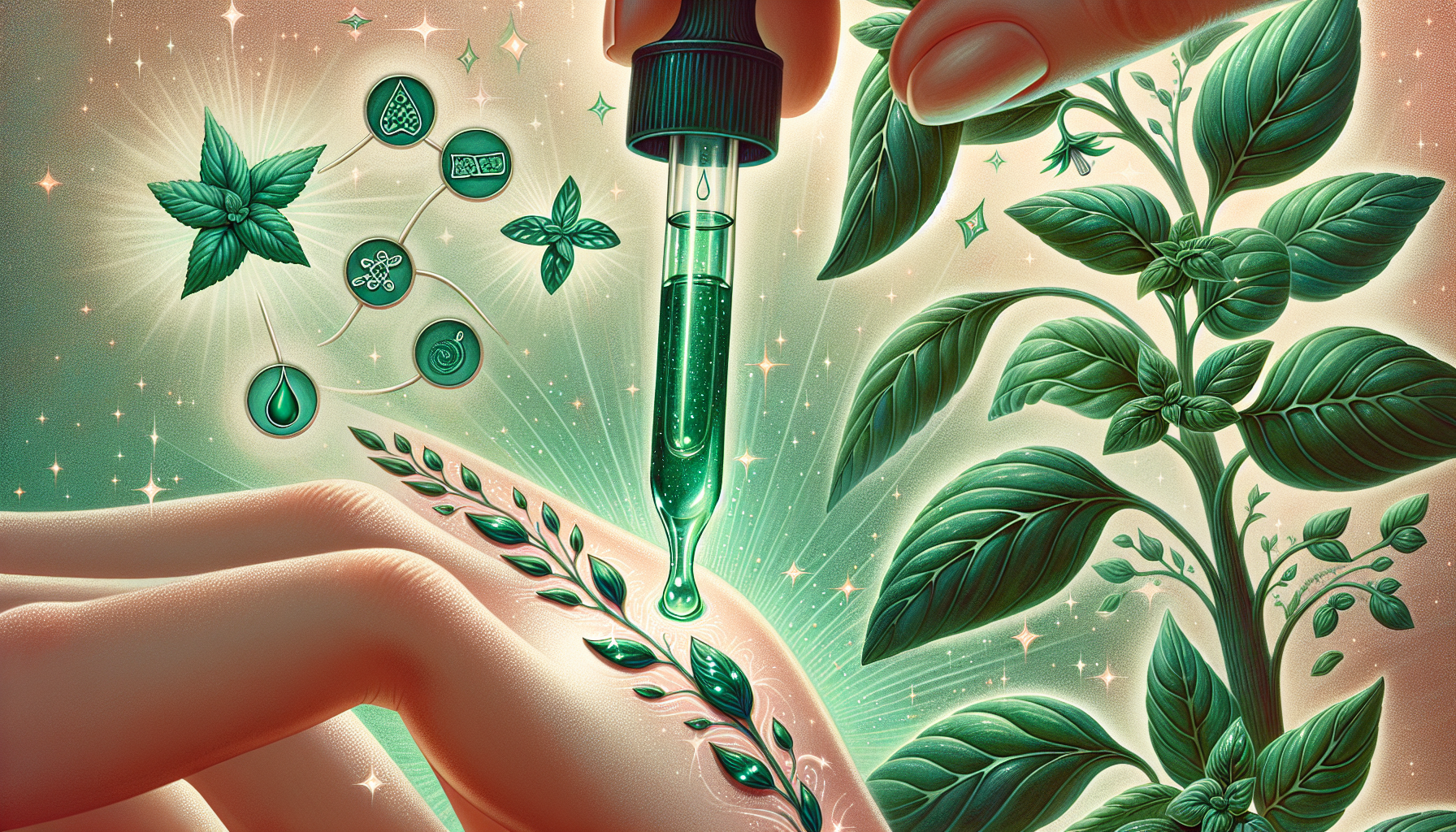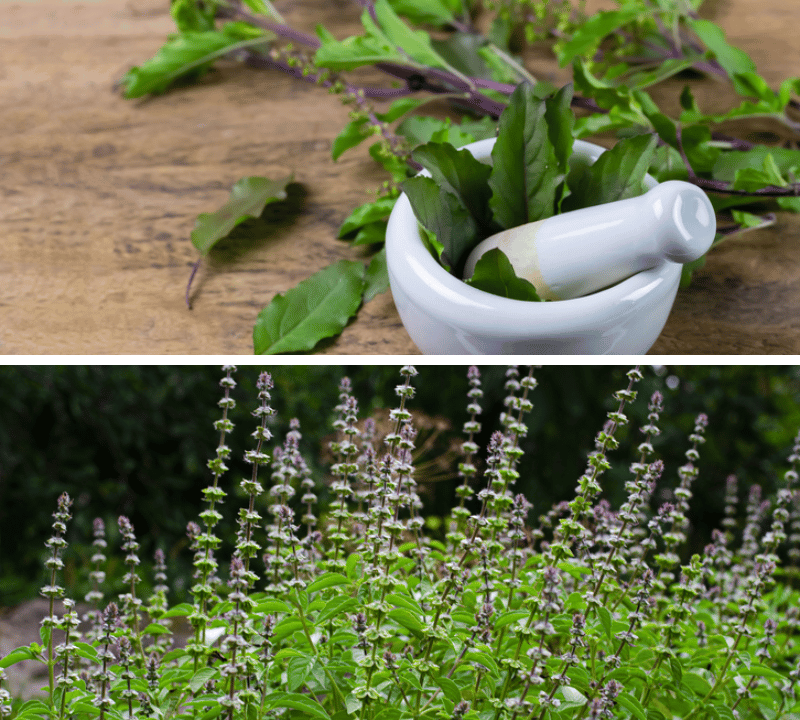In Ayurvedic medicine, the sacred herb known as holy basil or tulsi stands out for its spiritual significance and the profound health benefits it is purported to offer. This green leaf's potential advantages are impressive, from managing blood sugar levels to combating stress and bolstering the immune system. However, amidst the reverence and growing popularity, critical questions loom large: "Is holy basil worth it?" and, more importantly, "How does one navigate its use amidst the myriad of dietary supplements available?" This article aims to dissect the layers of scientific evidence surrounding holy basil, presenting a balanced view that neither exaggerates its benefits nor understates its risks.
The allure of holy basil extends beyond its aromatic leaves to its versatile forms—the soothing tulsi tea, the potent holy basil leaf extract, or the fragrant essential oil. Yet, as we delve deeper into its use in herbal medicine, particularly within the framework of traditional Ayurveda, it becomes imperative to approach it cautiously. The interplay between holy basil and modern medications, especially concerning blood clotting, blood pressure, and the intricate mechanisms involved in its anti-stress effects and antioxidant activities, demands a thorough understanding. Through a comprehensive exploration, this article will guide you through the holistic benefits of incorporating holy basil into your health regimen while highlighting the essential considerations and potential drug interactions that come with taking holy basil. Armed with knowledge, you can decide whether the sacred tulsi plant, with its dark green leaves and myriad medicinal properties, is a valuable addition to your wellness journey.
Key Takeaways
- Holy basil, or tulsi, shows potential health benefits such as improving blood sugar levels, reducing stress, and boosting the immune system. Yet, care should be taken when using alongside other medications.
- Further research is necessary to fully understand holy basil’s therapeutic effects, establish long-term safety, and determine the optimal dosages for health benefits, as current evidence is inconclusive.
- Holy Basil can be consumed in various forms—tea, fresh leaves, or oil—and has practical daily uses. Still, potential side effects and interactions, particularly regarding fertility, bleeding risk, and sedatives, must be considered.
Evaluating Holy Basil's Health Benefits

Unlike its traditional counterpart, Holy basil is more than just a culinary delight. It’s a potential powerhouse for health, with possible benefits including blood sugar control, stress relief, and immune support. There’s something special about the holy basil plant, be it the fresh tulsi leaves, the potent holy basil leaf extract, or the aromatic holy basil oil.
The effects of holy basil are impressive, having shown promise in lowering unbalanced blood sugar levels, managing anxiety symptoms, and bolstering immune system function. However, it’s worth delving into this further.
The Impact on Blood Sugar Control
Managing blood sugar levels can be a constant balancing act, particularly for those with diabetes. Enter holy basil. Evidence suggests that holy basil enhances pancreatic beta-cell function and insulin secretion, promoting improved glucose uptake by muscle cells. Studies suggest that holy basil can stimulate insulin secretion from pancreatic beta-cells, hinting at its therapeutic potential in diabetes management.
Furthermore, consuming holy basil may help reduce post-meal blood glucose spikes, contributing to regulating blood sugar levels. However, individuals on diabetes medications should exercise caution as holy basil could lower blood sugar levels excessively when taken alongside these medications.
Stress-Relief Properties of an Adaptogen Herb

Stress - it’s a word we’re all too familiar with. But have you ever heard of an adaptogen herb? Holy basil is recognized as an adaptogenic herb that helps the body resist the detrimental effects of stress. The secret lies in its fundamental constituents, ocimumosides A and B, and 4-allyl-1-O-beta-D-glucopyranosyl-2-hydroxybenzene, which aid in managing stress. These compounds are believed to influence the hypothalamic-pituitary-adrenal (HPA) axis, potentially offering anti-stress effects.
Immune Boosting Effects

It’s no secret that a robust immune system is crucial to our overall health. This is where holy basil comes into play, exhibiting immunomodulatory effects that hint at potential immune-boosting capabilities.
Historically used in India for treating colds, coughs, and influenza, holy basil may enhance the immune response against viral infections thanks to its antioxidant and antimicrobial properties.
The Science Behind Holy Basil

While the possible benefits of holy basil are intriguing, comprehending the science that backs it is equally important. Additional research is needed to establish the health advantages of holy basil. This investigation will also help identify the optimal dosage for maximum effectiveness. Currently, there are no guidelines for the appropriate dosage of holy basil, highlighting the need for more extensive, more definitive studies.
Understanding how holy basil may improve symptoms of metabolic conditions is urgent and requires further research. This research will provide insight into how holy basil may assist in managing metabolic conditions. Now, let’s examine the existing research landscape.
Clinical Studies Overview
Clinical studies offer a fascinating glimpse into the potential of holy basil. When used in conjunction with standard diabetes medications, holy basil significantly improves glycemic control, reflecting a decrease in various blood sugar levels and mean total cholesterol levels in patients with noninsulin-dependent diabetes. However, the form of holy basil supplementation, whether in capsules or powders and the specific parts of the plant used are critical factors influencing the efficacy of the supplements.
In addition, holy basil has gained attention for its supplementary role in cancer treatments, attributed to its capacity to alleviate chemotherapy and radiation therapy side effects and its radioprotective and chemoprotective advantages, showcasing some holy basil benefits.
Mechanisms Involved
Understanding the mechanisms behind holy basil’s therapeutic effects is crucial. Some studies have highlighted the anti-inflammatory properties of Ocimum sanctum, which could underlie its ability to relieve pain and reduce fever. The anti-inflammatory effects of Ocimum sanctum may be due to its modulation of different inflammation mediators, as indicated by various animal studies.
In addition, holy basil has demonstrated the ability to enhance endogenous antioxidant defenses in human cell lines, indicating a protective mechanism against oxidative stress.
Areas Requiring Further Research
Despite its promise, the scientific understanding of holy basil isn’t complete. Though some studies suggest that Ocimum sanctum may have radioprotective effects, there is a need for more definitive research to confirm such benefits. There is currently insufficient information on the long-term safety of consuming holy basil, which concerns consumers and healthcare professionals.
More comprehensive research, especially long-term studies on brain health and stress relief, is critical to comprehend the full range of health benefits.
Practical Uses of Holy Basil in Daily Life
Beyond its potential health benefits, holy basil offers practical uses in daily life. Whether you’re sipping on a comforting cup of holy basil tea, adding fresh tulsi leaves to your favorite dish, or applying holy basil oil topically, there are various ways to incorporate this herb into your routine.
Let’s examine some of these practical uses.
Culinary and Herbal Tea Delights
Regarding culinary creativity, holy basil offers a wealth of opportunities. Its distinct flavor is a staple in Thai cuisine, often added to stir-fries in dishes like pad krapow that feature meat or seafood. And let’s not forget about the herbal teas!
To craft a flavorful tulsi tea, combine dried holy basil leaves with hot water, allowing them to steep for 1–2 minutes to extract the essence.
Topical Applications for Skin Health

But the uses of holy basil extend beyond the kitchen. Topical applications of holy basil oil may improve skin health due to its antibacterial, antiviral, and anti-inflammatory properties.
For instance, one practical use of holy basil essential oil is to improve acne among various skin conditions.
Potential Side Effects and Cautions
Despite the potential health benefits of holy basil, awareness of possible side effects and interactions is essential. The most common side effects of holy basil are nausea and diarrhea, and some studies suggest it could potentially reduce fertility by damaging sperm. Consulting a healthcare provider and adhering to product label instructions is pivotal before using holy basil, mainly when used with other medications.
Pregnant and breastfeeding women are advised against the use of holy basil unless under the supervision of a doctor.
Recognizing Common Side Effects
Acknowledging the potential side effects of holy basil is of paramount importance. Short-term oral intake of holy basil might lead to nausea or diarrhea. If you experience such side effects, it’s essential to consult a doctor.
The long-term safety of holy basil use has not been well-established beyond eight weeks, warranting caution with extended use.
Understanding Drug Interactions
Drug interactions are another crucial consideration when using holy basil. For example, holy basil may amplify the effects of blood-thinning medications by possibly causing slow blood clotting and increased bleeding risk. Using holy basil seed oil with sedative medications could enhance drowsiness, requiring caution with drugs like pentobarbital.
After reviewing supplement labels, it’s always advisable to consult with healthcare providers to discuss potential interactions with medications, ensuring safe use of holy basil.
Navigating the Best Choices: A Curated Guide to Top Holy Basil Supplements
In pursuing health and wellness through natural supplements, holy basil stands out for its remarkable adaptogen herb properties, offering benefits from stress reduction to immune system enhancement. Recognizing the importance of choosing the right supplement, our investigation extends beyond merely understanding supplement labels and the critical factors of quality and purity. To assist you in making the most informed decision, we’ve curated a detailed guide, “From Stress-Busting to Immunity: A Guide to the Best Holy Basil Supplement,” highlighting five premium holy basil supplements that meet but exceed the stringent criteria discussed.
This guide meticulously evaluates each supplement based on its active ingredients, specifically ursolic acid and triterpenes content, purity levels, absence of contaminants, and adherence to third-party testing standards. Our selection emphasizes supplements offering the most therapeutic benefits, ensuring they come from reputable sources and prioritizing efficacy and safety. Whether you’re looking for holy basil in capsules, tablets, or liquid extracts, our guide provides insights into the top choices that align with the benefits discussed, such as lowering blood sugar levels, enhancing digestive and bone health, and promoting wound healing.
By consulting this comprehensive article, readers can confidently navigate the diverse market of holy basil supplements containing holy basil extract, selecting a product that aligns with their health goals. Each recommended supplement has been vetted to ensure it meets high efficacy, quality, and safety standards, providing a trusted path to integrating holy basil into your health regimen. And as a bonus, this article also lists one of the top Holy Basil teas for those who want to steer clear of concentrates. Discover your ideal holy basil supplement (and tea!) by exploring our guide. 👇
Preservation and Storage Tips
Appropriate preservation and storage methods are essential in preserving holy basil's medicinal properties and effectiveness. Whether you’re storing fresh tulsi leaves or holy basil supplements, the right storage practices can make all the difference in preserving their potency.
Let’s delve into the best practices for preserving and storing holy basil, including properly handling holy basil seeds, while considering the benefits of taking holy basil.
Storing Fresh Tulsi Leaves
Fresh tulsi leaves can be stored in the refrigerator for up to five days when sealed in a bag or for up to a week with stems submerged in water and covered with a plastic bag to keep them from drying out. For optimal freshness, holy basil leaves should be kept in a cool environment and protected from direct sunlight and excess moisture.
For extended preservation, drying tulsi leaves at the right temperature and storing them in an airtight container can preserve their quality for extended periods.
Keeping Supplements Effective
Storage is just as crucial for holy basil supplements. They must be stored properly to ensure they remain effective over time. Supplements can degrade and lose potency when exposed to light, heat, and moisture.
Capsules and tablets are best preserved when kept in a cool, dark, and dry place. Retaining the supplements in their original packaging can prevent the degradation of medicinal compounds.
Integrating Holy Basil with Traditional and Modern Medicine
Holy basil has a rich history in Ayurveda and can be integrated with both traditional and Ayurvedic medicine to support overall well-being. Its use dates back centuries; today, it’s available as an over-the-counter supplement and culinary herb. Let’s probe further into its role in Ayurveda and its potential to complement traditional treatments.
Holy Basil in Ayurveda
In Ayurveda, holy basil is revered for its health-promoting properties and ability to treat various conditions. It’s associated with divine protection in Hindu mythology and is valued in Indian households. Holy basil is recognized as a powerful herb that balances different bodily energies or doshas, with a slight chance of increasing Pitta in already overheated individuals.
A holy basil plant within the home offers mental and spiritual benefits, including it being a natural insect repellent.
Complementing Conventional Treatments
Holy basil may not only serve as a stand-alone therapy but could also complement conventional treatments. For example, holy basil may enhance the effects of anticoagulants, necessitating careful monitoring when used concomitantly. When used with antidiabetic drugs, Holy Basil could potentially lower blood sugar too much, requiring close supervision and possible adjustment of medication doses.
Some studies suggest that Holy Basil could complement conventional treatments like chemotherapy, potentially enhancing their effectiveness while reducing side effects.
Embracing Tradition and Science: A Summary of Holy Basil's Holistic Health Benefits
Holy basil, revered in traditional medicine for its myriad health benefits, invites a nuanced exploration of its role in contemporary wellness practices. Its capacity to modulate blood glucose levels, alleviate stress through anti-inflammatory and anti-stress activities, and fortify the immune system underscores its esteemed position in herbal medicine. Yet, holy basil's value is in its broad therapeutic applications and the specificity of its strains—Krishna tulsi, Rama tulsi, and others—each harboring unique medicinal properties. The sacred plant's interaction with the body's mechanisms, from enhancing glutathione and antioxidant enzymes to influencing blood pressure and aiding in wound healing, highlights its potential as a versatile dietary supplement. However, integrating holy basil into health routines demands a conscientious approach, especially given its effects on blood clotting and potential drug interactions, emphasizing the critical role of healthcare professionals in guiding its use.
For those intrigued by the depth of holy basil's medicinal potential, our article, "Discover Which Holy Basil Is the Most Medicinal for Optimal Health Benefits," offers an enlightening deep dive. This exploration delves into the distinctive qualities of the holy basil varieties, shedding light on centuries-old wisdom and scientific findings that differentiate their contributions to health and wellness. By examining the specific effects of holy basil leaf extract, seed oil, and essential oils, alongside their implications for digestive health, bone health, and skin disorders, this piece provides invaluable insights for those seeking to optimize the health benefits of this adaptogen herb. Readers can discern the most medicinal strains of holy basil through this detailed examination, enriching their understanding and application of this sacred plant in pursuit of holistic well-being. Check it out here. 👇
Frequently Asked Questions
How long does it take for holy basil to work?
You may not see immediate results, but after a week, improvements from taking holy basil can be noticed. For treating anxiety, stress, and depression, expect to see significant improvements after 60 days of treatment.
What are the side effects of holy basil?
Holy basil is generally safe for up to 8 weeks but may cause nausea or diarrhea. Long-term safety is uncertain, and excessive use could lead to liver damage. Be cautious and monitor any potential side effects closely.
Who should not use holy basil?
Pregnant women or women trying to conceive and those allergic to holy basil or the mint plant family should avoid using it. It may also cause upset stomach and should be used cautiously by those with low blood sugar.
How effective is holy basil?
Holy basil may reduce blood pressure, blood sugar, and cholesterol while potentially supporting memory and immune health.
What are the potential health benefits of holy basil?
Holy basil may offer potential health benefits such as controlling blood sugar levels, relieving stress, and boosting immune function.
Thanks for joining us to explore this simple question: "Is Holy Basil worth it?" We hope this discussion has helped clarify how beneficial this remarkable natural herb is. Also, if you want to add to your library of knowledge, you should check out the other articles mentioned and linked above. It never hurts to add to your knowledge arsenal!
Please return soon to check out our next review of another incredible supplement – we’re always looking out for YOU!
*We are NOT qualified medical advisors. The content here is only based on our personal opinions and should NOT be used as a substitute for a healthcare professional's advice!











Member discussion